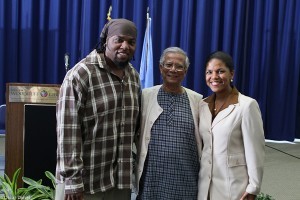
Terreon Gully, Dr. Muhammad Yunus, Dr. Ramona Houston
Last week my husband Terreon Gully and I attended a lecture by Dr. Muhammad Yunus at the Atlanta University Center Woodruff Library. A Bangladeshi banker, economist and 2006 Nobel Peace Prize recipient, Dr. Yunus discussed the concepts of his newly released book Building Social Business: The New Kind of Capitalism that Serves Humanity’s Most Pressing Needs.
As we were getting out of our car, my husband grabbed his headphones. I reiterated to him that we were going to a lecture and that he did not need his headphones. Terreon replied, “Yes, I do. If I do not like the lecture, I am going to listen to my music.” (I am glad to report that Terreon listened to the entire lecture!) Dr. Yunus is founder of Grameen Bank and is best known for his work in microcredit and microfinance. Through Grameen Bank microloans are given to individuals too poor to qualify for traditional loans due to the lack of collateral and lack of banking and credit history. Through these loans individuals and groups have the opportunity to create small businesses that take them out of abject poverty, which impacts the entire society. Instead of distributing the profits to shareholders, Grameen Bank reinvest the profits in the community through other microloans.
Grameen Bank, therefore, has institutionalized the concept of social business enterprise by addressing the issue of poverty in the country. Throughout his lecture Yunus emphasized the importance of social entrepreneurship, creating business enterprises that focus on a social purpose as opposed to businesses that focus solely on profits. Yunus explained that for any and every social problem, there is business that can be created to solve that problem. There are two types of businesses: 1) those that make money for self and 2) those that make money to change the world. According to Yunus human beings exist not to make money but to make an impact on the world.
I was quite intrigued by Yunus’s ideas. He explained that he came up with his concepts of microlending from observing the practices of loan sharks in Bangladesh and how they control the lives of poor people. Looking at our own society, loan sharks are quite evident, particularly in the African American and Latino American communities. They manifest as pay day lenders, pawn shops and check cashing companies. All are derivatives of loan sharks and our communities disproportionately suffer from their unethical and questionable business practices.
Microlending has successfully addressed the issue of poverty and loan sharks in Bangladesh. Can microlending work in African American and Latino communities? There are numerous issues that our communities can address though building social businesses–education, health care, criminal justice, juvenile delinquency, teenage pregnancy, financial literacy, access to higher education and the list goes on. What are some of the ideas that come to your mind as a social business for the African American and Latino American communities? I believe that there is at least one issue that we can come together to address. I look forward to your thoughts.
Building Social Business is my recommended reading for the month for September. (I see I just started my book club.) I look forward to reading the book and having a lively discussion with you at the end of the month.



Post a comment